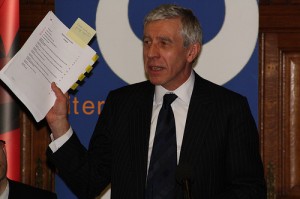The justice secretary Jack Straw will examine the use of so-called ‘super injunctions’ following yesterday’s Trafigura-Guardian row, the Prime Minister, Gordon Brown told MPs in Parliament today.
As reported by PA Mediapoint on Press Gazette, Gordon Brown called secret injunctions, which not only banned reporting of a story but also the existence of the ban itself, an ‘unfortunate’ area of UK law.
Since yesterday’s events which saw Carter-Ruck abandon an attempt to stop the Guardian publishing a tabled question for Parliament, Peter Bottomley, a Conservative MP, told the house he was reporting Carter-Ruck, the law firm acting on behalf of Trafigura, to the Law Society, on the grounds that no lawyers should be able to inhibit the reporting of Parliament.
Carter-Ruck has disputed the Guardian’s account of events published on Monday evening, in a statement available via its website [Full contents at this PDF link].
“There has never been any question of Trafigura applying for an injunction that had as its purpose the prevention of publication of any matter arising in Parliament. No such application has ever been made,” it stated.
“Nevertheless, as formulated (and as The Guardian apparently accepts) the Order would indeed have prevented The Guardian from reporting on the Parliamentary Question which had been tabled for later this week,” the statement said.
The Guardian stated in an editorial today that they were told not to report the question, in line with an existing order. “When we became aware that the existence of this order had been mentioned in a parliamentary question we sought to vary the terms of the injunction. We were advised by Carter-Ruck that publication would place us in contempt of court,” stated the Guardian.
Private Eye was the first publication to publish Paul Farrelly’s question, the fortnightly magazine proclaimed in a story on its site.
“The MP’s [Paul Farrelly] intention to test this conspiracy of silence [secret ‘super-injunctions’] by asking questions about it using parliamentary privilege was revealed in Private Eye 1246, which went on sale on 29 September – a full two weeks before the Twittersphere caught up with the story.”
“There is an emerging culture of anonymity in which justice is not even seen to be done, and that is an unfortunate, rather dangerous trend,” said Ian Hislop, the magazine’s editor.
“I thought Private Eye’s job was to expose this. That is why I decided to publish the MP’s questions as the first item in the parliamentary column in yesterday’s [Tuesday] edition of Private Eye,” he said.
“The questions mentioned a recent court case in which we were defendants and concerned a matter on which I had given evidence to a parliamentary select committee. It seemed to me impossible that, in 2009, there could be any reason why we would not be allowed to publish privileged material available from the House of Commons. I saw the questions on the parliament website and I could not think of any judicial ruling which could overrule parliament, so I went ahead. That’s what we’re for.”
But the UK injunction on the report referenced in Paul Farrelly’s question remains.
“The issuing by the courts of so-called ‘super-injunctions’ is rightly controversial and a matter of growing concern,” MP Paul Farrelly said in a statement yesterday.
“That is why, using parliamentary privilege, I tabled these questions to Jack Straw at the Ministry of Justice as a matter of urgency.”
“The practice offends the time-honoured ‘rule against prior restraint’, which safeguards freedom of expression in this country. It also fails to protect whistleblowers, acting in the public interest. The huge legal bills involved in fighting cases, too, have a chilling effect on legitimate investigative journalism.”
